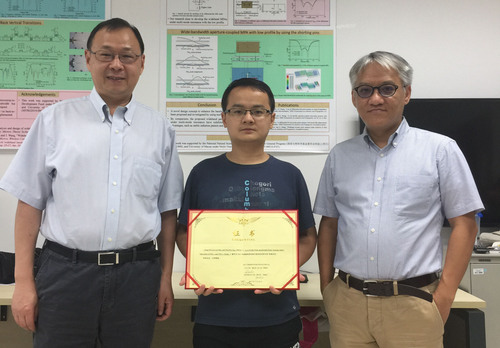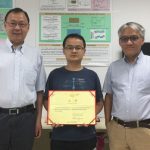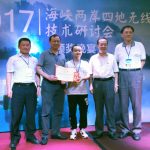 (From left) Prof Zhu Lei, Liu Nengwu, and Prof Choi Wai Wa.
(From left) Prof Zhu Lei, Liu Nengwu, and Prof Choi Wai Wa.
A paper jointly written by Liu Nengwu, a student from the Department of Electrical and Computer Engineering, Faculty of Science and Technology, University of Macau (UM); Zhu Lei, head of the department; and Choi Wai Wa, an associate professor from the department, recently received the Best Paper Award at the Cross-Strait Quad-Regional Radio Wireless Conference (CSQRWC) 2017. Titled ‘Low-Profile Wide-Bandwidth Patch Antenna under Operation of TM0,1/2 and TM2,1/2 Modes’, the paper proposes a novel design concept to enhance the bandwidth of microstrip patch antennas (MPA).
Using the multi-mode theory, this design can help to achieve the goal of producing MPAs with low profile, wide impedance bandwidth, and stable normal radiation pattern. The paper received attention from experts, scholars, and industrial practitioners at the conference. This year’s conference was held in Chenzhou, Hunan province. Many experts and scholars from mainland China, Hong Kong, Macao, and Taiwan, including Zhu Lei from UM, Weng Jinlu from Sun Yat-sen University in Taiwan, and Luk Kwai Man from the City University of Hong Kong, attended the conference and delivered keynote speeches. Over 74 technical papers were presented, and only four received the Best Paper Award.
First held in 1998, the CSQRWC is an important annual academic conference in the field of wireless communications technology in the Chinese-speaking community. Hosts of the conference rotate every year among mainland China, Taiwan, Hong Kong, and Macao. The event provides a platform for participants to discuss the various theories, technologies, and applications of wireless mobile communication, wireless network, satellite communication, microwave remote sensing, and electromagnetic compatibility.
View gallery


